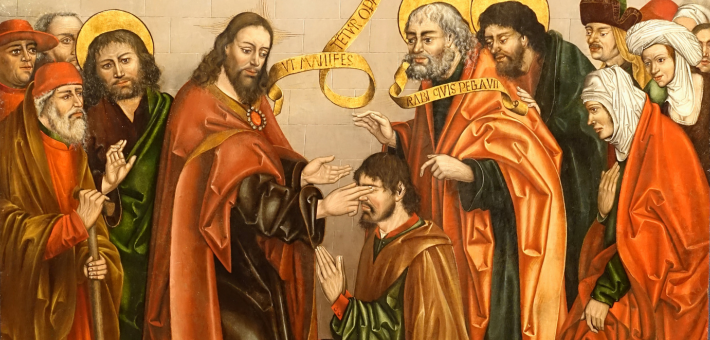Commentary on Jeremiah 31:7-9
Are we in the right book? “Sing aloud with gladness for Jacob …” (Jeremiah 31:7)?!1 Jeremiah is remembered as the “weeping prophet” (see 9:11; 13:17; et cetera)—not the happy one.2 For chapters on end, Jeremiah announces coming judgment and destruction upon the people as a result of their refusal to turn from idolatry, political corruption, and social injustice.3 At several junctures, God even tells Jeremiah not to pray for the people, or simply says that prayers from neither will be heard (7:16; 11:11; 14:11–12; 15:1).
Nevertheless, we find ourselves here within four chapters (Jeremiah 30–33) in the middle of the book that exhibit a marked shift toward future hope.4 Further, the first two chapters of this section are a literary unit known as the Book of Consolation.5 Here we witness a remarkable and sustained change in God’s disposition toward the people.
It’s not that God’s judgment is nullified, or has been forgotten by God or the people. It remains very much a reality. After telling Jacob to “have no fear” in 30:10, God reminds the people at 30:15, “I did these things to you because your iniquity was so great.” However, it becomes clear that God’s judgment is neither for the sake of itself nor the final word, but has a greater purpose and reveals something crucial about the nature of God.
The reason for God’s urging in Jeremiah 31:7 for Jacob to “sing aloud with gladness” is that something big is about to happen, something that will change Israel’s outlook for the future. God is going to bring all those who have been exiled back to the land promised to them through their ancestors. “See, I am going to bring them from the land of the north, and gather them from the farthest parts of the earth” (31:8). No one will be left out of this great restoration, especially not those who would typically find themselves at the back of the line or the bottom of the pecking order—“the blind and the lame, those with child and those in labor, together” (31:8).
There is even the suggestion that God will no longer refuse to hear the petitions of the people. In addition to “singing aloud” and “raising shouts” in verse 7, God encourages the people to say “Save, O LORD, your people, the remnant of Israel.”6
Further indication comes at 31:15–16 that God is in fact listening to the cries of the people: “Thus says the LORD: A voice is heard in Ramah, lamentation and bitter weeping. Rachel is weeping for her children; she refuses to be comforted for her children, because they are no more. Thus says the LORD: Keep your voice from weeping, and your eyes from tears; for there is a reward for your work, says the LORD: they shall come back from the land of the enemy.”
That God hears these cries amounts to more than simply the successful transmission of the message, as if over an unbroken telegraph wire. That God hears indicates further that God is open to the content of the cries, such that God may be moved in response to what God is hearing.7
There is a further reason the petitions of the people and God’s hearing them matter—why they could conceivably “move” the divine toward some shift or action. A major aspect of Jeremiah’s theology is that of covenant. Covenant constitutes relationship, and the covenant between God and God’s people is one that God initiated and has unwavering faithfulness to uphold. At least 36 times in the book, God refers to Israel as “my people”—even when the context is judgment and impending punishment (for example, 2:11, 13, 31, 32).
In this coming return of the remnant to their ancestral land, God is not going to send a fleet of Ubers. Instead, God is going to personally lead this entourage back: “With consolations I will lead them back, I will let them walk by brooks of water, in a straight path in which they shall not stumble” (Jeremiah 31:9). Notice the clear first-person—and not only will God personally accomplish this; God will do so “with consolations.” In other words, God has divine compassion for these people.
That the people will come “with weeping” (31:9) also points to the intimacy of the relationship between God and God’s people that surrounds this return. Are they weeping because of the pain of what they have been experiencing in exile, or are these tears of joy? Perhaps both. In any case, note that it is God who refers to their weeping, and thus it is something God notices.
God’s compassion shown in the announcement and execution of this return is part of God’s covenant faithfulness. The divine compassion continues to show through in verse 9 with God’s self-identification as “a father to Israel” and the identification of Ephraim as God’s own “firstborn.” Elsewhere, we also find a God whose judgment does not overshadow or eliminate God’s covenant love. Jeremiah 31:3 refers to God’s “everlasting love” (Hebrew ahava olam) and faithfulness (Hebrew hesed).
God’s harsh judgment and punishment for this people and God’s compassionate, faithful covenant love shown in restoration are not at odds. In fact, they together show just how deeply God loves covenant partners. This God loves profoundly enough to hear the cries of slaves and free them, to judge and punish and then restore a remnant of a rebellious people, to hear the cries of a blind man and heal him, and even enough to die for those who, even at their worst, are still looked upon as “my people.”
Notes
- Biblical quotes are from the New Revised Standard Version unless otherwise noted.
- The Confessions of Jeremiah (perhaps better termed “laments”) highlight the pain and suffering the prophet endures because of the message he bears to the people. Jeremiah 11:18–23; 12:1–6; 15:10–21; 17:14–18; 18:19–23; 20:7–13.
- See, for instance, the Temple Sermon of chapter 7.
- Patrick D. Miller, “The Book of Jeremiah: Introduction, Commentary, and Reflections,” in The New Interpreter’s Bible Commentary 6 (Nashville: Abingdon, 1994), 797.
- Jeremiah is not without words of consolation elsewhere (for example, 29:11), but never to the sustained degree found in these chapters.
- While there is some ambiguity regarding whether the verb should be translated as an imperative or a past tense (perfect), the address remains from the people to God, at God’s own urging.
- Think, for instance, of the multiple indications of God’s awareness of the suffering of the slaves in Egypt in Exodus 3:7. We quickly see that this constitutes much more than the accumulation of divine data. Instead, God is moved to action, to work out the freeing of the people through Moses.


October 27, 2024